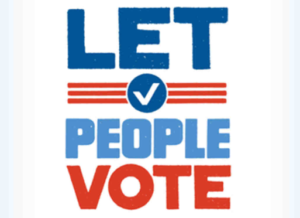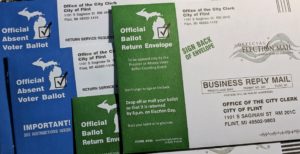By Paul Rozycki
A few years ago I was asked to give a presentation on the right to vote to a large number of prospective election workers at City Hall. As I looked out over the audience, I realized that almost none of those present could have voted when this nation began. The great majority of those in the council chambers that day, preparing to conduct our elections, were female and/or African-American. None could vote when this nation began.
We like to think that once we got rid of King George in 1776 and wrote a Constitution in 1787, that everyone was part of our democracy. Not quite. In the 1790s, you could vote only if five things were true about you. You had to be an adult, white, male, who owned property, and, in some states, belong to the right religion. Maybe 10 percent of the population even had the right to vote then.
Over time that changed. By the 1820s and 1830s the property requirements and religious tests were mostly gone. By 1870, because of the 15th Amendment, at least for a short time, African Americans could vote. That right was taken away, starting in 1877, with the end of Reconstruction, Jim Crow, the wide use of literacy tests, grandfather clauses, poll taxes, white primaries, and violence. It took the Voting Rights Act of 1964 to restore that right.

Photo source: American Civil Liberties Union (ACLU) website
In 1920 women finally got the right to vote nation-wide after a half-century struggle. In 1924 Native Americans became citizens and got the right to vote. And in 1972, 18 year olds got the voting right.
In every case it took a lot of work and struggle to gain and keep the right to vote. And after last year’s election, it seems that the struggle isn’t quite over.
The 2020 election increased voting turnout in two major ways. The COVID pandemic caused many states to make absentee and mail-in voting easier, and the political divisions over Donald Trump’s presidency energized voters on both sides of the partisan aisle.
By most estimates, there were as many as 17 million new voters last year. Over the last 30 years the average turnout has been about 55 or 60 percent of the potential voters. Last year the turnout nation-wide, was about 67 percent. In Michigan there was almost a 71 percent turnout.
Yet with all the changes due to the pandemic, and the larger turnout, the election took place, and the results were clear. Joe Biden got about 81 million votes and Donald Trump got about 74 million. Biden got the majority of electoral votes. Much credit goes to the election workers who adjusted to last minute changes and made it work in the midst of a pandemic.
Like all of our previous elections that should have been it. One party won. One party lost and let’s move on. But it wasn’t. Trump’s claim that he was cheated led to the Jan. 6 insurrection and storming of the Capitol. Trump still makes the unfounded claims of a stolen election the centerpiece of his rallies, even a year after he lost, and even after many Republicans have moved on.
Trump’s claims led Republicans in many states to change their voting laws to make it more difficult to vote. Though the details varied, at least 47 states introduced bills that would limit voting by having extensive ID requirements, limiting Sunday voting, reducing the number of polling places and drop boxes and, in one state, making it illegal to give food or drink to those in voting lines.

Campaigns signs posted on the lawn in front of a voting station in Ward 7. (Photo by Paul Rozycki)
Right now, Michigan is one of those states. Even before the pandemic, Michigan approved no excuse absentee voting with Proposal 3, in 2018. But in response to the false claims of election fraud, the Michigan legislature is moving ahead with two proposals to limit the vote. One would be passed by the legislature and go to the governor for her signature (or veto). The other is an initiative that would go to the voters. The two proposals are complex but are very similar. Here’s the key points.
- Voters would need a Photo ID (that’s true now) but if they didn’t have one they couldn’t just sign an affidavit to their identity and cast a provisional ballot, as they do now. To have their ballot count the voter would have to show up at the local clerk’s office within six days with a valid ID.
- For absentee voters there would be new ID requirements. They would need to include a photo ID, or driver’s license number, or the last four digits of their social security number.
- Election officials would be prohibited from sending out unsolicited requests for absentee ballots, as Michigan has done, and many candidates have done.
- It would modify how local governments choose polling places.
- Election officials could not accept private funds (including federal funds) to support their efforts. Some feel this might even ban volunteers from working with elections.
Some of the provisions simply restate what is already common practice, like requiring IDs. A few reasonable provisions may be tucked in as well. But the overall partisan purpose is clear—to reduce the Democratic turnout. There are more details, but that’s the essentials.
But here’s what’s different in Michigan. That proposal has passed the legislature and, like all bills, will go to the governor’s desk for her signature to approve it, or a veto to reject it. Governor Whitmer has already vetoed some of these proposals, and there is no doubt she will veto the rest.
However, Michigan has a rather unusual initiative process, where a proposal can be put before the voters for approval on the ballot. To put an initiative on the ballot requires about 340,000 signatures from registered voters in Michigan.
Once that is done it goes on the ballot for the next election for voters to approve or disapprove. However, Michigan’s initiative has an odd loophole. Instead of sending an initiative to the voters, the legislature can take up the proposal, and pass it before the election. If they do, the governor does not have the power to veto it.

Flint residents lined up at City Hall to cast ballots in the 2020 election. (Photo by Paul Rozycki)
That’s what’s happening now. The proposal called Secure MI Vote is now being circulated, and if it gets the required 340,000 signatures, the Republican legislature will almost certainly take it up, and pass it on their own, bypassing the governor.
These proposals are a solution in search of a problem. After more than 60 court challenges, many audits and recounts, no significant voter fraud has been found for the 2020 election. It’s probably been the most honest election in our history. In states, where small errors were found, they often benefited Biden more often than Trump. Yet, within the last few weeks, conservative groups protested in front of the Capitol Building in Lansing, claiming the Michigan election was stolen, and asking for one more audit of the 2020 election, where Biden won by 154,000 votes.
The Secure MI Vote proposal is simply a partisan attempt to make it more difficult to vote, and reduce the turnout, particularly for minorities.
Based on the 2020 election, making it more difficult to vote absentee may hurt Democrats, and aid Republicans, but that may not always be the case. Before the 2020 election, the absentee vote had generally been more Republican, and limiting that vote may come back to haunt the Republican Party.

Absentee ballot envelopes sent out to residents. (Photo by Paul Rozycki)
There is also some evidence that trying to limit the vote may actually encourage marginal voters to get out and cast their ballots. In a few states turnout increased after attempts to limit the vote got the attention of infrequent voters.
But in the end, the real damage of the Secure MI Vote proposal, and all the talk about a stolen election, isn’t to Democrats or Republicans. The real damage is to the trust we have in our whole political system. The election process is the basis for our democracy. If we lose that, we’ve lost the core idea of our government. That damage could last long after both Trump and Biden are history.
Secure MI Vote won’t secure anyone’s vote, and makes for a less secure democracy.
Don’t sign the petition.

EVM political commentator Paul Rozycki can be reached at paul.rozycki@mcc.edu.


You must be logged in to post a comment.